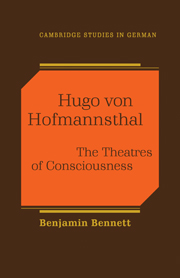Book contents
- Frontmatter
- Contents
- Preface
- Acknowledgments
- List of Abbreviations
- Part I Principles of lyric and drama
- Part II Language and society
- 7 Chandos and his neighbors
- 8 Werther and Chandos
- 9 Hofmannsthal's return
- 10 Missed meetings in Der Schwierige
- 11 Hans Karl's return
- 12 Society as drama
- Part III Culture and collapse
- Conclusion
- Notes
- Index of works
- General index
9 - Hofmannsthal's return
Published online by Cambridge University Press: 04 August 2010
- Frontmatter
- Contents
- Preface
- Acknowledgments
- List of Abbreviations
- Part I Principles of lyric and drama
- Part II Language and society
- 7 Chandos and his neighbors
- 8 Werther and Chandos
- 9 Hofmannsthal's return
- 10 Missed meetings in Der Schwierige
- 11 Hans Karl's return
- 12 Society as drama
- Part III Culture and collapse
- Conclusion
- Notes
- Index of works
- General index
Summary
Hofmannsthal's development is nothing if not complex. Technical difficulties and philosophical difficulties echo one another, breed one another, and confuse one another; every form, every achievement, every completed text, reveals new problems. I have already simplified the situation considerably by leaving narrative out of consideration, and by postponing until Part III a discussion of the more publicly conceived theatrical works, the festival plays and musical plays. In the present chapter, I will discuss an attempt on Hofmannsthal's own part to simplify his situation and justify to himself his continuing in the poetic–intellectual career that had been made problematic in Chandos and the tragedies.
By a cryptic “inner dating,” Hofmannsthal suggests that “Die Briefe des Zurückgekehrten” must be thought of in relation to the Chandos letter; but neither this feature of the text nor the idea of “the heightened moment” justifies Kobel's assertion that “The emigrant, who has lived eighteen years overseas and now returns to Germany, undergoes experiences similar to Lord Chandos’” (p. 157). Kobel quotes the following to substantiate his point:
Sometimes in the morning, in these German hotel rooms, it happened that the jug and the wash basin, or a corner of the room with the table and coat-rack, appeared so not-real to me, in spite of their indescribable ordinariness, so utterly not real, in a sense ghostly, and also provisional, waiting, occupying so to speak only temporarily the place of the real jug and the real wash basin filled with water.
(P2 298–9)- Type
- Chapter
- Information
- Hugo von HofmannsthalThe Theaters of Consciousness, pp. 142 - 155Publisher: Cambridge University PressPrint publication year: 1988



